寒假英语学习计划表
- 格式:docx
- 大小:13.61 KB
- 文档页数:3
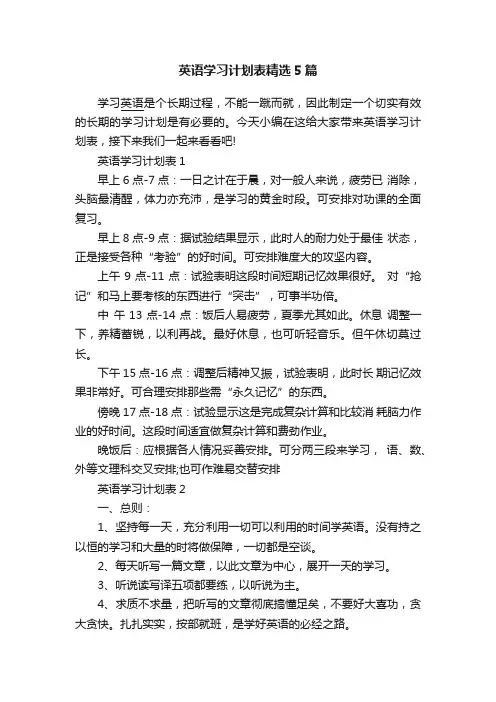
英语学习计划表精选5篇学习英语是个长期过程,不能一蹴而就,因此制定一个切实有效的长期的学习计划是有必要的。
今天小编在这给大家带来英语学习计划表,接下来我们一起来看看吧!英语学习计划表1早上6点-7点:一日之计在于晨,对一般人来说,疲劳已消除,头脑最清醒,体力亦充沛,是学习的黄金时段。
可安排对功课的全面复习。
早上8点-9点:据试验结果显示,此时人的耐力处于最佳状态,正是接受各种“考验”的好时间。
可安排难度大的攻坚内容。
上午9点-11点:试验表明这段时间短期记忆效果很好。
对“抢记”和马上要考核的东西进行“突击”,可事半功倍。
中午13点-14点:饭后人易疲劳,夏季尤其如此。
休息调整一下,养精蓄锐,以利再战。
最好休息,也可听轻音乐。
但午休切莫过长。
下午15点-16点:调整后精神又振,试验表明,此时长期记忆效果非常好。
可合理安排那些需“永久记忆”的东西。
傍晚17点-18点:试验显示这是完成复杂计算和比较消耗脑力作业的好时间。
这段时间适宜做复杂计算和费劲作业。
晚饭后:应根据各人情况妥善安排。
可分两三段来学习,语、数、外等文理科交叉安排;也可作难易交替安排英语学习计划表2一、总则:1、坚持每一天,充分利用一切可以利用的时间学英语。
没有持之以恒的学习和大量的时将做保障,一切都是空谈。
2、每天听写一篇文章,以此文章为中心,展开一天的学习。
3、听说读写译五项都要练,以听说为主。
4、求质不求量,把听写的文章彻底搞懂足矣,不要好大喜功,贪大贪快。
扎扎实实,按部就班,是学好英语的必经之路。
5、把零碎的时间充分利用起来学英语,不断地重复。
6、听写是个学习英语的好方法,要继续加强。
7、早睡早起学英语。
8、抓住一套教材足矣,不要盲目的更换教材。
9、每天学习英语必须要有详细可行的计划,必须坚决执行,没有任何借口。
10、相信自己,一定能够学好英语。
二、分则:(一)听力:2、早晚都随身带mp3,一有空闲时间就反复听这篇短文,直到听烂为止。
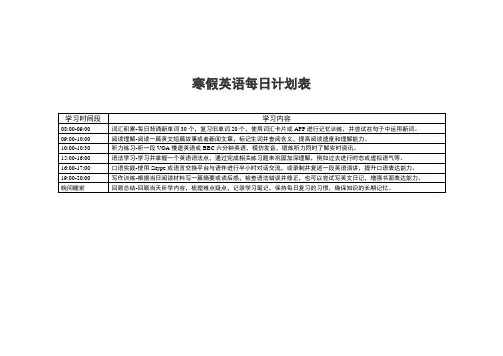
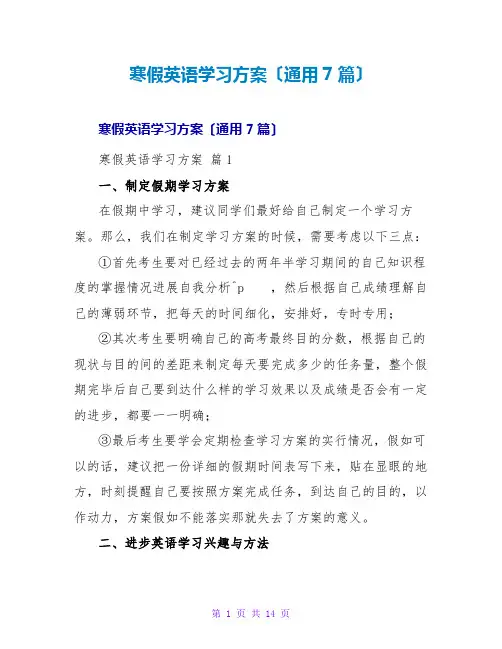
寒假英语学习方案〔通用7篇〕寒假英语学习方案〔通用7篇〕寒假英语学习方案篇1一、制定假期学习方案在假期中学习,建议同学们最好给自己制定一个学习方案。
那么,我们在制定学习方案的时候,需要考虑以下三点:①首先考生要对已经过去的两年半学习期间的自己知识程度的掌握情况进展自我分析^p ,然后根据自己成绩理解自己的薄弱环节,把每天的时间细化,安排好,专时专用;②其次考生要明确自己的高考最终目的分数,根据自己的现状与目的间的差距来制定每天要完成多少的任务量,整个假期完毕后自己要到达什么样的学习效果以及成绩是否会有一定的进步,都要一一明确;③最后考生要学会定期检查学习方案的实行情况,假如可以的话,建议把一份详细的假期时间表写下来,贴在显眼的地方,时刻提醒自己要按照方案完成任务,到达自己的目的,以作动力,方案假如不能落实那就失去了方案的意义。
二、进步英语学习兴趣与方法假期,没有了教师的约束与管理,也没有了同学间学习竞争共同进步的气氛,很容易会懈怠,所以自律很关键。
学习方案能不能顺利完成就需要看是否有学习方法了,只有高效的学习才能事倍功半。
英语是一门语言,语言是文化的一局部,而文化具有非常深沉的底蕴与历史内涵,所以没有语言文化背景,学习英语就会产生障碍。
因为不理解英语的风俗文化,思维方式与历史背景,就会存在一些词汇,俗语等的理解问题。
所以最理想,最实用的方法就是通过阅读大量文章或者名家著作来进步对英语学习的兴趣,同时进步语言词汇的积累,进而进步成绩。
考生可以根据自身情况来适当调整每日的阅读量,可以从每天15分钟的美文阅读来入手,也可以选择有音频的跟读,锻炼口语,模拟发音。
一定要持之以恒,不可半途而废,英语学习是一项着重积累的过程,只有不停的反复记忆与阅读,才可把知识牢牢锁在脑子里,当考试时自然知识全部熟记,成绩也会随之进步。
另外一个重点--笔记。
无论学习什么,都要将所学内容记在笔记本上。
笔记是对所学知识的内容与精华与总结,也就是在复习中应着重看的内容。
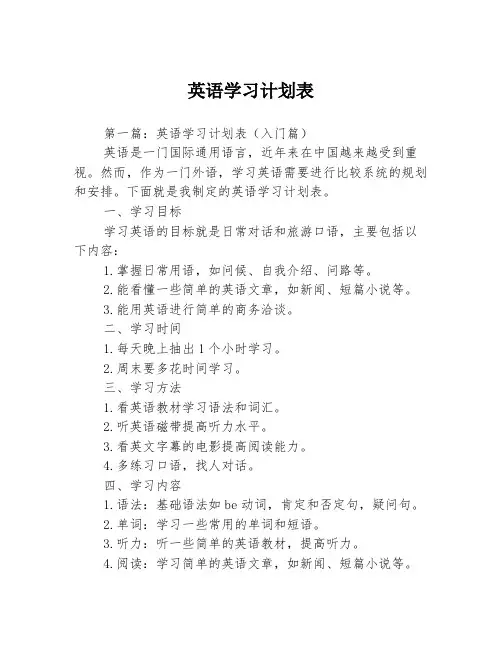
英语学习计划表
第一篇:英语学习计划表(入门篇)
英语是一门国际通用语言,近年来在中国越来越受到重视。
然而,作为一门外语,学习英语需要进行比较系统的规划和安排。
下面就是我制定的英语学习计划表。
一、学习目标
学习英语的目标就是日常对话和旅游口语,主要包括以下内容:
1.掌握日常用语,如问候、自我介绍、问路等。
2.能看懂一些简单的英语文章,如新闻、短篇小说等。
3.能用英语进行简单的商务洽谈。
二、学习时间
1.每天晚上抽出1个小时学习。
2.周末要多花时间学习。
三、学习方法
1.看英语教材学习语法和词汇。
2.听英语磁带提高听力水平。
3.看英文字幕的电影提高阅读能力。
4.多练习口语,找人对话。
四、学习内容
1.语法:基础语法如be动词,肯定和否定句,疑问句。
2.单词:学习一些常用的单词和短语。
3.听力:听一些简单的英语教材,提高听力。
4.阅读:学习简单的英语文章,如新闻、短篇小说等。
5.口语:多与人交流,熟练日常口语。
以上就是我的英语学习计划表,我会严格按计划执行,为我自己的英语学习打好基础。
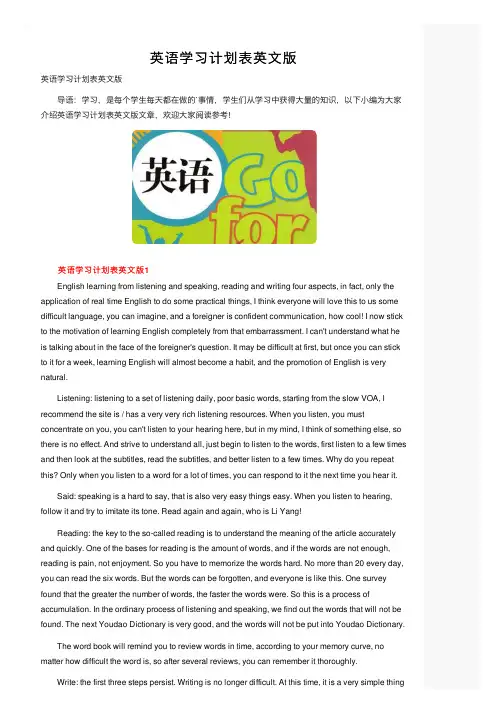
英语学习计划表英⽂版英语学习计划表英⽂版 导语:学习,是每个学⽣每天都在做的`事情,学⽣们从学习中获得⼤量的知识,以下⼩编为⼤家!介绍英语学习计划表英⽂版⽂章,欢迎⼤家阅读参考 English learning from listening and speaking, reading and writing four aspects, in fact, only the application of real time English to do some practical things, I think everyone will love this to us some difficult language, you can imagine, and a foreigner is confident communication, how cool! I now stick to the motivation of learning English completely from that embarrassment. I can't understand what he is talking about in the face of the foreigner's question. It may be difficult at first, but once you can stick to it for a week, learning English will almost become a habit, and the promotion of English is very natural. Listening: listening to a set of listening daily, poor basic words, starting from the slow VOA, I recommend the site is / has a very very rich listening resources. When you listen, you must concentrate on you, you can't listen to your hearing here, but in my mind, I think of something else, so there is no effect. And strive to understand all, just begin to listen to the words, first listen to a few times and then look at the subtitles, read the subtitles, and better listen to a few times. Why do you repeat this? Only when you listen to a word for a lot of times, you can respond to it the next time you hear it. Said: speaking is a hard to say, that is also very easy things easy. When you listen to hearing, follow it and try to imitate its tone. Read again and again, who is Li Yang! Reading: the key to the so-called reading is to understand the meaning of the article accurately and quickly. One of the bases for reading is the amount of words, and if the words are not enough, reading is pain, not enjoyment. So you have to memorize the words hard. No more than 20 every day, you can read the six words. But the words can be forgotten, and everyone is like this. One survey found that the greater the number of words, the faster the words were. So this is a process of accumulation. In the ordinary process of listening and speaking, we find out the words that will not be found. The next Youdao Dictionary is very good, and the words will not be put into Youdao Dictionary. The word book will remind you to review words in time, according to your memory curve, nomatter how difficult the word is, so after several reviews, you can remember it thoroughly. Write: the first three steps persist. Writing is no longer difficult. At this time, it is a very simple thingto express oneself in English. In addition, I read more English movies and listen to some English lectures. What I think is a good Ted lecture is not only able to understand their progress, check their learning effects, but also bring happiness to English learning. The key to English learning is to stick to it, and the plan is not detailed enough. I will give advice on the progress of your study. When you insist on a period of time, it is sure to enjoy the fun, because when your level is improved, the sense of achievement will naturally bring fun. Come on. 英语学习计划表英⽂版2 I will be in the third grade now,Since the highschool entrance examination is coming soon, there is a great need for me to make a precise plan of my studies. From September to November,I will follow the teachers in the new lessons learning, and after class , the contemporary exercises are necessary. Before the end of the first term, I will review all the lessons from beginning again. From March to April, review all I have learned a second time. Beginning from April, models tests should be the all.Several days before the exam, I will go over all the mistakes in the papers and have a good rest for the exam. I hope this plan can further my studies.。
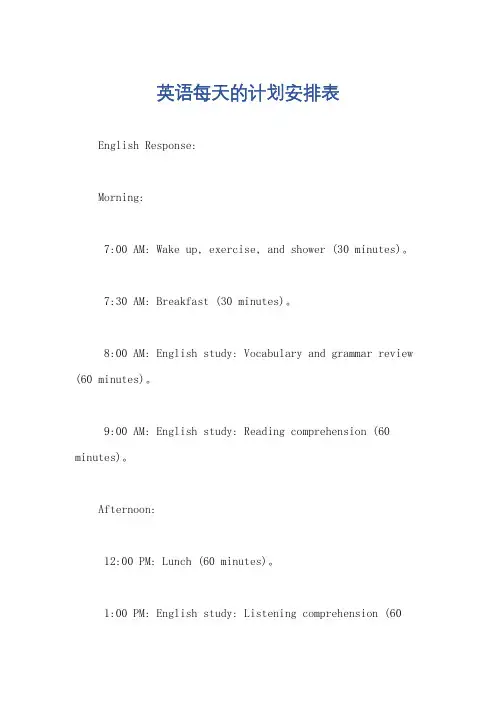
英语每天的计划安排表English Response:Morning:7:00 AM: Wake up, exercise, and shower (30 minutes)。
7:30 AM: Breakfast (30 minutes)。
8:00 AM: English study: Vocabulary and grammar review (60 minutes)。
9:00 AM: English study: Reading comprehension (60 minutes)。
Afternoon:12:00 PM: Lunch (60 minutes)。
1:00 PM: English study: Listening comprehension (60minutes)。
2:00 PM: English study: Speaking practice (60 minutes)。
Evening:6:00 PM: Dinner (60 minutes)。
7:00 PM: English study: Review and practice (60 minutes)。
8:00 PM: Free time (relaxation, hobbies)。
10:00 PM: Bedtime.Weekend:Saturday: Full day of English immersion (movies, podcasts, books)。
Sunday: Half-day of English study (conversation, writing)。
Additional Tips:Use a language learning app throughout the day for short bursts of practice.Surround yourself with English-speaking media and culture.Practice speaking English with a native speaker or language partner.Set realistic goals and track your progress to stay motivated.Be patient and persistent, as language learning takes time and effort.中文回答:早上:7:00 起床,锻炼,洗漱(30分钟)。
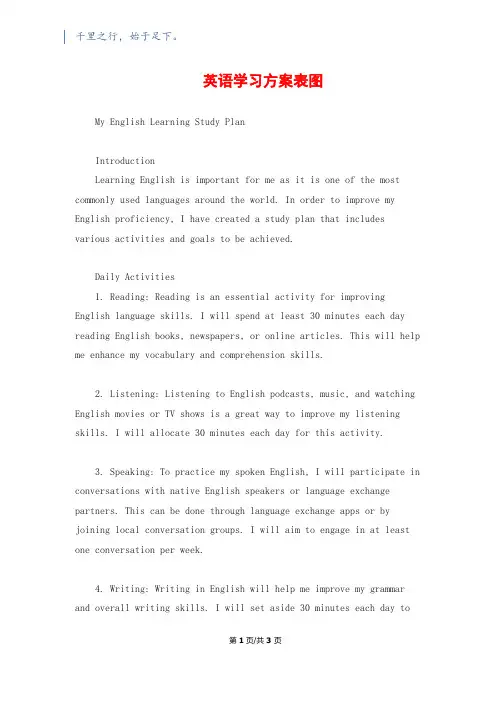
千里之行,始于足下。
英语学习方案表图My English Learning Study PlanIntroductionLearning English is important for me as it is one of the most commonly used languages around the world. In order to improve my English proficiency, I have created a study plan that includes various activities and goals to be achieved.Daily Activities1. Reading: Reading is an essential activity for improving English language skills. I will spend at least 30 minutes each day reading English books, newspapers, or online articles. This will help me enhance my vocabulary and comprehension skills.2. Listening: Listening to English podcasts, music, and watching English movies or TV shows is a great way to improve my listening skills. I will allocate 30 minutes each day for this activity.3. Speaking: To practice my spoken English, I will participate in conversations with native English speakers or language exchange partners. This can be done through language exchange apps or by joining local conversation groups. I will aim to engage in at least one conversation per week.4. Writing: Writing in English will help me improve my grammar and overall writing skills. I will set aside 30 minutes each day to第1页/共3页锲而不舍,金石可镂。
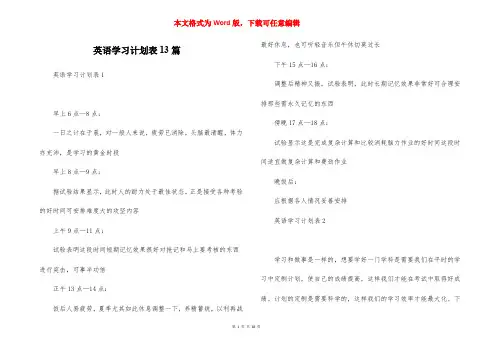
英语学习计划表13篇英语学习计划表1早上6点—8点:一日之计在于晨,对一般人来说,疲劳已消除,头脑最清醒,体力亦充沛,是学习的黄金时段早上8点—9点:据试验结果显示,此时人的耐力处于最佳状态,正是接受各种考验的好时间可安排难度大的攻坚内容上午9点—11点:试验表明这段时间短期记忆效果很好对抢记和马上要考核的东西进行突击,可事半功倍正午13点—14点:饭后人易疲劳,夏季尤其如此休息调整一下,养精蓄锐,以利再战最好休息,也可听轻音乐但午休切莫过长下午15点—16点:调整后精神又振,试验表明,此时长期记忆效果非常好可合理安排那些需永久记忆的东西傍晚17点—18点:试验显示这是完成复杂计算和比较消耗脑力作业的好时间这段时间适宜做复杂计算和费劲作业晚饭后:应根据各人情况妥善安排英语学习计划表2学习和做事是一样的,想要学好一门学科是需要我们在平时的学习中定制计划,使自己的成绩提高,这样我们才能在考试中取得好成绩。
计划的定制是需要科学的,这样我们的学习效率才能最大化。
下面是专家为大家总结的高中英语学习计划。
早上6点-8点:一日之计在于晨,对一般人来说,疲劳已消除,头脑最清醒,体力亦充沛,是学习的黄金时段。
早上8点-9点:据试验结果显示,此时人的耐力处于最佳状态,正是接受各种考验的好时间可安排难度大的攻坚内容。
上午9点-11点:试验表明这段时间短期记忆效果很好对抢记和马上要考核的东西进行突击,可事半功倍。
正午13点-14点:饭后人易疲劳,夏季尤其如此休息调整一下,养精蓄锐,以利再战最好休息,也可听轻音乐但午休切莫过长。
下午15点-16点:调整后精神又振,试验表明,此时长期记忆效果非常好可合理安排那些需永久记忆的东西。
傍晚17点-18点:试验显示这是完成复杂计算和比较消耗脑力作业的好时间这段时间适宜做复杂计算和费劲作业。
晚饭后:应根据各人情况妥善安排早晚背英语单词效果都很好哦,词汇量是英语的重点,可以结合有效的记忆法和工具达到事半功倍的效果,可以结合学英语的网站,还有,趁有功夫时练练体育吧.补充1:1.坚持每天读写记,这些必不可少2.要记好笔记,你觉得重要的或需要巩固的都记下来.课后一定要好好复习,仔细抓住知识点.3.一定要刻苦,这是最重要的,什么重要的都记,哪怕你已经会了,还是再掌握一遍好,以打牢基础为目标另外多听听一些过来人的学习经验,相信会对你有所帮助~。
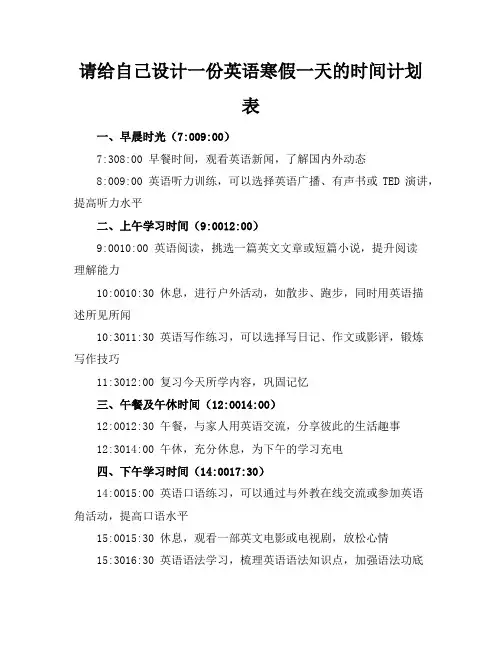
请给自己设计一份英语寒假一天的时间计划表一、早晨时光(7:009:00)7:308:00 早餐时间,观看英语新闻,了解国内外动态8:009:00 英语听力训练,可以选择英语广播、有声书或TED演讲,提高听力水平二、上午学习时间(9:0012:00)9:0010:00 英语阅读,挑选一篇英文文章或短篇小说,提升阅读理解能力10:0010:30 休息,进行户外活动,如散步、跑步,同时用英语描述所见所闻10:3011:30 英语写作练习,可以选择写日记、作文或影评,锻炼写作技巧11:3012:00 复习今天所学内容,巩固记忆三、午餐及午休时间(12:0014:00)12:0012:30 午餐,与家人用英语交流,分享彼此的生活趣事12:3014:00 午休,充分休息,为下午的学习充电四、下午学习时间(14:0017:30)14:0015:00 英语口语练习,可以通过与外教在线交流或参加英语角活动,提高口语水平15:0015:30 休息,观看一部英文电影或电视剧,放松心情15:3016:30 英语语法学习,梳理英语语法知识点,加强语法功底16:3017:30 参加线上英语角或社群活动,与他人交流学习心得,拓展视野五、傍晚时光(17:3019:00)17:3018:00 晚餐,用英语描述食物的味道、口感,提升英语表达能力18:0019:00 英语歌曲欣赏,学习歌词中的生词和表达,陶冶情操六、晚间学习时间(19:0021:00)19:0020:00 英语阅读,继续提升阅读速度和理解能力20:0021:00 英语词汇学习,背诵单词、短语,扩大词汇量七、睡前时光(21:0022:30)21:3022:30 睡前阅读,挑选一本英文原著,沉浸在英语的世界中,安然入睡遵循这份时间计划表,相信你的英语能力会在寒假期间得到显著提升。
加油!五、晚间休闲与自我提升(21:3023:00)21:3022:00 自我反思,用英语记录下今天的感悟和成长,培养批判性思维22:0022:30 英语听力深化,选择一段难度较高的英语播客或讲座,挑战自己的听力极限22:3023:00 准备进入梦乡,躺在床上用英语默念一段喜欢的诗歌或文章,让英语成为你梦境的一部分六、周末特别安排(可选)参加线下的英语沙龙或俱乐部,与他人面对面交流,提高实际运用能力。
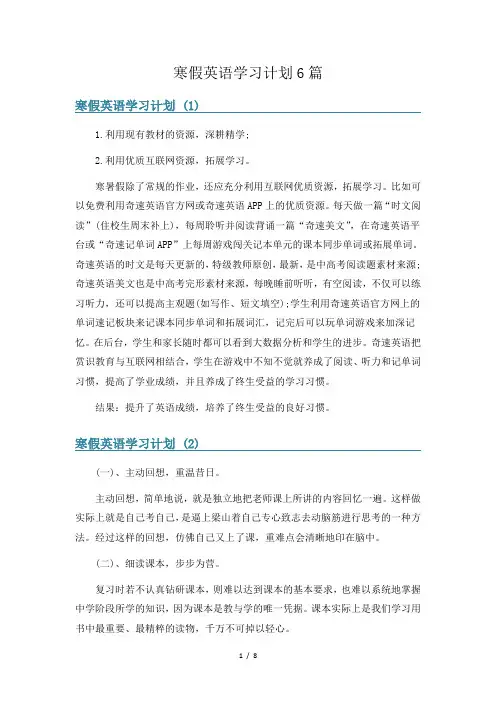
寒假英语学习计划6篇寒假英语学习计划 (1)1.利用现有教材的资源,深耕精学;2.利用优质互联网资源,拓展学习。
寒暑假除了常规的作业,还应充分利用互联网优质资源,拓展学习。
比如可以免费利用奇速英语官方网或奇速英语APP上的优质资源。
每天做一篇“时文阅读”(住校生周末补上),每周聆听并阅读背诵一篇“奇速美文”,在奇速英语平台或“奇速记单词APP”上每周游戏闯关记本单元的课本同步单词或拓展单词。
奇速英语的时文是每天更新的,特级教师原创,最新,是中高考阅读题素材来源;奇速英语美文也是中高考完形素材来源,每晚睡前听听,有空阅读,不仅可以练习听力,还可以提高主观题(如写作、短文填空);学生利用奇速英语官方网上的单词速记板块来记课本同步单词和拓展词汇,记完后可以玩单词游戏来加深记忆。
在后台,学生和家长随时都可以看到大数据分析和学生的进步。
奇速英语把赏识教育与互联网相结合,学生在游戏中不知不觉就养成了阅读、听力和记单词习惯,提高了学业成绩,并且养成了终生受益的学习习惯。
结果:提升了英语成绩,培养了终生受益的良好习惯。
寒假英语学习计划 (2)(一)、主动回想,重温昔日。
主动回想,简单地说,就是独立地把老师课上所讲的内容回忆一遍。
这样做实际上就是自己考自己,是逼上梁山着自己专心致志去动脑筋进行思考的一种方法。
经过这样的回想,仿佛自己又上了课,重难点会清晰地印在脑中。
(二)、细读课本,步步为营。
复习时若不认真钻研课本,则难以达到课本的基本要求,也难以系统地掌握中学阶段所学的知识,因为课本是教与学的唯一凭据。
课本实际上是我们学习用书中最重要、最精粹的读物,千万不可掉以轻心。
(三)、整理笔记,注重感悟。
整理笔记的任务有:1、补。
补上该记而没记的内容,使知识系统化。
2、正。
更正课堂记录不太准确,用词不当,深度不够的地方。
3、添。
添上个人学习的心得、见解、评价等。
整理笔记的时候,还可顺带将自己的感悟写下来,这些感悟,是你最可宝贵的一笔财富。
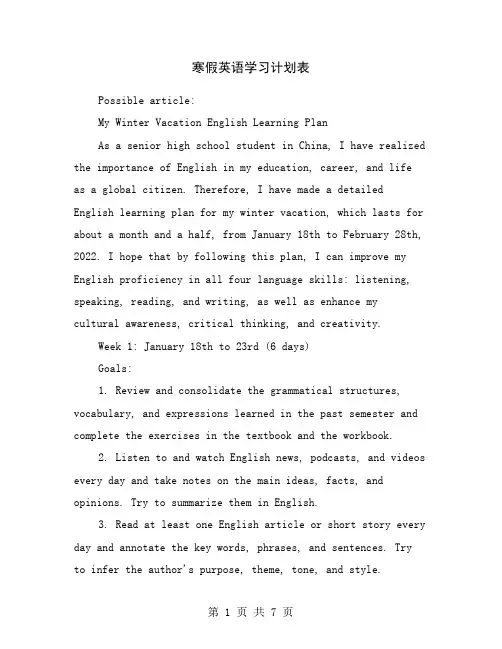
寒假英语学习计划表Possible article:My Winter Vacation English Learning PlanAs a senior high school student in China, I have realized the importance of English in my education, career, and life as a global citizen. Therefore, I have made a detailed English learning plan for my winter vacation, which lasts for about a month and a half, from January 18th to February 28th, 2022. I hope that by following this plan, I can improve my English proficiency in all four language skills: listening, speaking, reading, and writing, as well as enhance mycultural awareness, critical thinking, and creativity.Week 1: January 18th to 23rd (6 days)Goals:1. Review and consolidate the grammatical structures, vocabulary, and expressions learned in the past semester and complete the exercises in the textbook and the workbook.2. Listen to and watch English news, podcasts, and videos every day and take notes on the main ideas, facts, and opinions. Try to summarize them in English.3. Read at least one English article or short story every day and annotate the key words, phrases, and sentences. Tryto infer the author's purpose, theme, tone, and style.4. Write a 300-word English essay on a topic of my choice, using appropriate grammar, vocabulary, and organization. Review and correct it with the help of my English teacher or tutor.Activities:1. Attend the online English course organized by my school, which covers the units of time and past events.2. Watch TED Talks, Vox, and other educational videos on current affairs, science, or cultural diversity, andparticipate in online discussions or debates with my classmates or teachers.3. Listen to BBC news, NPR, or podcasts on technology, sports, or entertainment, and write a summary or a critical review based on my own perspective.4. Read CNN, Time, or National Geographic articles, or short stories written by authors such as Roald Dahl, Oscar Wilde, or J.K. Rowling, and share my insights and reflections with my peers or mentors.Week 2: January 24th to 30th (7 days)Goals:1. Enhance my listening skills by practicing different accents and intonations, such as British, American, or Australian English. Watch English movies, TV shows, ormusicals, and try to understand the dialogues and songs without subtitles.2. Improve my speaking skills by participating in online or offline oral English competitions, debates, or speeches, and practicing pronunciation, fluency, and confidence.3. Expand my vocabulary by learning 10 to 20 new words or phrases every day, and using them in various contexts, such as writing, speaking, or playing word games.4. Develop my writing skills by analyzing and imitating the styles of famous English writers, such as William Shakespeare, Emily Dickinson, or George Orwell, and composing original poems, stories, or essays.Activities:1. Join the English drama club or choir of my school, and rehearse for a performance or a competition. Practice the lines and songs, and try to express the emotions and personality of the character or the genre.2. Participate in the online speaking competition, such as the International Public Speaking Competition or theJunior Achievement Worldwide, and prepare a 5-minute speech on a theme of my choice, such as leadership, innovation, or diversity.3. Play online word games, such as Scrabble, Boggle, or Words with Friends, with my friends or family members, and learn new words and phrases in a fun and interactive way.4. Read and study the works of famous English writers from different periods and genres, such as Romeo and Juliet, Hamlet, To Kill a Mockingbird, The Great Gatsby, or The Catcher in the Rye, and write a brief review or analysis based on my own interpretation.Week 3: January 31st to February 6th (7 days)Goals:1. Practice and review the grammar and vocabulary related to the units of the present and future, and apply them toreal-life situations, such as making plans, predictions, or recommendations.2. Improve my listening and speaking skills by listening to and speaking with native English speakers, either onlineor offline, and trying to understand and communicate with them effectively.3. Enhance my reading and writing skills by reading and writing academic papers, such as research proposals,literature reviews, or argumentative essays, and using appropriate citation and referencing styles.4. Develop my critical thinking and creativity by engaging in creative writing, such as poetry, fiction, ordrama, and exploring different themes, perspectives, and genres.Activities:1. Join the language exchange program or the pen pal program, and find a native English speaker or a foreignstudent who is interested in practicing Chinese or exchanging cultures. Chat with them in English on a regular basis andask them about their customs, hobbies, and opinions.2. Attend the online English seminar or workshoporganized by the British Council, the Embassy of the United States, or the International English Language Testing System (IELTS), and learn new skills and strategies for effective communication.3. Read and analyze academic papers or articles in myfield of interest, such as psychology, biology, or economics, and summarize or critique them in English.4. Write and share a creative piece of writing, such as a sonnet, a short story, or a script, based on a prompt or a theme, such as love, fear, or time.Week 4: February 7th to 13th (7 days)Goals:1. Prepare for and take the mock test of the IELTS, TOEFL, or other English proficiency exams, and evaluate my strengths and weaknesses in the four language skills.2. Get feedback and guidance from my English teacher or tutor, and revise and improve my essays, speeches, or academic papers accordingly.3. Build up my confidence and motivation by celebratingmy achievements and progress, and setting new goals and challenges for the future.4. Have fun and relax by reading, watching, or playing English materials that I enjoy, and using English as a meansof entertainment and leisure.Activities:1. Attend the online or offline English mock test of my school or a language center, and practice the listening, reading, writing, and speaking modules under exam conditions.2. Discuss with my English teacher or tutor about my test scores and performance, and learn some tips and strategiesfor maximizing my scores and avoiding common mistakes.3. Reflect on my learning journey and write a self-evaluation report, assessing my strengths, weaknesses, achievements, and challenges, and setting new goals and plans for the future.4. Watch English movies, TV shows, or documentaries thatI find interesting or inspiring, such as The Big Bang Theory, Friends, The Crown, or Planet Earth, and learn new vocabulary, culture, and knowledge in a relaxed and engaging way.Conclusion:In conclusion, my winter vacation English learning plan is designed to help me achieve a comprehensive and balanced improvement in the four language skills, as well as enhance my cultural awareness, critical thinking, and creativity. By setting specific goals and activities for each week and combining different modes and contexts of learning, I hope to make the best use of my time and resources and achieve outstanding results. I also believe that by cultivating a passion and curiosity for English and using it as a means of communication and expression, I can broaden my horizons, deepen my empathy, and enrich my personal growth.。
请给自己设计一份英语寒假一天的时间计划表篇一:高二英语寒假自主学习安排及要求高二大创英语寒假自主学习安排及要求首先祝大家假期快乐,新年快乐!英语中有一句话叫做: “time flies!”的确是如此啊!不知不觉中我们又迎来新的一年。
经过一个学期的辛苦工作,终于可以松一(转载自:小草范文网:请给自己设计一份英语寒假一天的时间计划表)口气了。
假期中我们不光需要好好休息,补充能量。
还需要做的事情就是对于我们之前学到的知识做一个总结和回顾,以便在新学期中有长足的进步。
高二年级是高中学习的分水岭,英语亦是如此。
有的学校在高二下学期就已经开始复习,因此,下面就英语学科如何合理有效地利用寒假时间,给大家提出几点建议。
一、对于单词,能在这个寒假完整的过一遍甚至两遍高考词汇是上上策。
XX年高考词汇将超过3500词,这其中很多词汇都是在高二上学期完成的。
寒假时间相对完整,利于学生根据自身需要合理分配,提前攻下词汇,为总复习做好准备。
高考中单词考核不同于中考,高考重在考察单词的搭配和运用,这一点在完形中尤其体现。
例如meet一词,高中生都知道是“遇见”的意思,所以高考中必然不会这样去考核,而meet the need则是高考中常见的考法。
我们也因此可以预见到高考中词汇的考法是十分灵活的,在日常的学习中不能只关注单字,更应注重单词在例句中的用法,因而寒假是背单词的最佳时间段。
背单词时最好对应例句,大声朗读出来,读出来的英语是记忆最快的,这样效率和收效反而会放大。
因此,同学们要在寒假期间重点复习必修五、选修六和选修七的重点词汇和短语,结合课堂笔记,认真巩固其用法和搭配。
二、寒假期间系统的复习一遍高中语法,开学后会倍感轻松。
高中语法项目我们已经全部学完,高二下即将进入总复习阶段,复杂的语法句型往往是学生最为头疼的又一大问题。
没有经过系统的整理,脑海中还是零零散散的语法片段,那很不系统,在较难的完形和阅读中更不能灵活翻译长难句,严重影响阅读速度和做题质量。
英语学习计划表精选5篇英语学习计划表1早上6点-7点:一日之计在于晨,对一般人来说,疲劳已消除,头脑最清醒,体力亦充沛,是学习的黄金时段。
可安排对功课的全面复习。
早上8点-9点:据试验结果显示,此时人的耐力处于最佳状态,正是接受各种“考验”的好时间。
可安排难度大的攻坚内容。
上午9点-11点:试验表明这段时间短期记忆效果很好。
对“抢记”和马上要考核的东西进行“突击”,可事半功倍。
中午13点-14点:饭后人易疲劳,夏季尤其如此。
休息调整一下,养精蓄锐,以利再战。
最好休息,也可听轻音乐。
但午休切莫过长。
下午15点-16点:调整后精神又振,试验表明,此时长期记忆效果非常好。
可合理安排那些需“永久记忆”的东西。
傍晚17点-18点:试验显示这是完成复杂计算和比较消耗脑力作业的好时间。
这段时间适宜做复杂计算和费劲作业。
晚饭后:应根据各人情况妥善安排。
可分两三段来学习,语、数、外等文理科交叉安排;也可作难易交替安排英语学习计划表2一、总则:1、坚持每一天,充分利用一切可以利用的时间学英语。
没有持之以恒的学习和大量的时将做保障,一切都是空谈。
2、每天听写一篇文章,以此文章为中心,展开一天的学习。
3、听说读写译五项都要练,以听说为主。
4、求质不求量,把听写的文章彻底搞懂足矣,不要好大喜功,贪大贪快。
扎扎实实,按部就班,是学好英语的必经之路。
5、把零碎的时间充分利用起来学英语,不断地重复。
6、听写是个学习英语的好方法,要继续加强。
7、早睡早起学英语。
8、抓住一套教材足矣,不要盲目的更换教材。
9、每天学习英语必须要有详细可行的计划,必须坚决执行,没有任何借口。
10、相信自己,一定能够学好英语。
二、分则:(一)听力:2、早晚都随身带mp3,一有空闲时间就反复听这篇短文,直到听烂为止。
3、周末看一部外国电影,复习就内容,检查一周来的学习计划执行情况。
4、重视精听,听无数遍。
英语学习计划表(26篇)一、总则:1、坚持每一天,充分利用一切可以利用的时间学英语。
没有持之以恒的学习和大量的时将做保障,一切都是空谈。
2、每天听写一篇文章,以此文章为中心,展开一天的学习。
3、听说读写译五项都要练,以听说为主。
4、求质不求量,把听写的文章彻底搞懂足矣,不要好大喜功,贪大贪快。
扎扎实实,按部就班,是学好英语的必经之路。
5、把零碎的时间充分利用起来学英语,不断地重复。
6、听写是个学习英语的好方法,要继续加强。
7、早睡早起学英语。
8、抓住一套教材足矣,不要盲目的更换教材。
9、每天学习英语必须要有详细可行的计划,必须坚决执行,没有任何借口。
10、相信自己,一定能够学好英语。
二、分则:(一)听力:1、除周末外,每天晚上10:00——12:00听写一篇五分钟左右的短文。
着重听力后的分析过程。
2、早晚都随身带MP3,一有空闲时间就反复听这篇短文,直到听烂为止。
3、周末看一部外国电影,复习就内容,检查一周来的学习计划执行情况。
4、重视精听,听无数遍。
(二)口语:1、朗读并努力复述听写的短文。
2、每天坚持张嘴说,每周参加英语角。
3、注意在朗读过程中纠正发音。
(三)阅读:1、每周阅读一份英语报纸。
2、每次整理笔记。
(四)写译:1、争取把每天听写的短文都翻译,先英汉,再汉英。
2、注意整理笔记。
英语学习计划表篇23 在这个“地球村”的时代,作为使用最为广泛的英语,在人们的心中十分地重要。
而我,作为一名初二的学生,学好英语不仅仅是学习成绩的需要,还是我自己心中梦想的需要。
我的梦想就是以后能够靠近外语类学校,成为一名英语翻译甚至是外交官,所以学好英语对我而言就十分重要了。
现在是初二下学期开学的前一天,我要结合上学期计划太多以至于不能很好完成的教训,制定一个符合我实际情况的的英语学习计划。
如下:一、学习目标1、本学期的英语成绩稳固上学期“优秀”的期末评价,在这基础上进一步发展,从92分向满分发展。
2、在初二需要掌握的词汇量的基础上,自己努力,多掌握一些单词词汇。
寒假周一到周日英语计划表下面是一个针对寒假期间,一周七天英语学习计划的示例,按照周一至周日制定:寒假英语学习周计划表星期一 - Monday- 上午 Morning Routine:- 7:00 - 8:00 AM: 起床后朗读15分钟英语美文或新闻摘要,锻炼发音和流利度。
- 8:00 - 9:00 AM: 学习新的英语单词列表,使用闪卡复习上周词汇,确保形、音、义的理解及运用。
- 上午 Mid-Morning:- 9:00 - 10:00 AM: 预习下一章节的英语教材内容,标注生词和难点,并查阅相关背景知识。
- 中午 Lunchtime Review:- 12:00 - 1:00 PM: 听力训练,如听一段英语广播或者观看一部简短的英语纪录片,并做笔记。
- 下午 Afternoon Session:- 2:00 - 3:00 PM: 完成一套针对性的语法练习题,巩固本周学习的语法点。
- 3:00 - 4:00 PM: 写作练习,围绕本周主题写一篇小短文或日记,提升书面表达能力。
- 傍晚 Evening Activity:- 6:00 - 7:00 PM: 参加线上英语角或小组讨论,提高口语交流技巧。
星期二至周日 - Tuesday to Sunday重复并调整周一的学习计划,保持连续性和规律性,并且可以根据个人兴趣和需求适当调整:- 每日常规活动 Daily Activities:- 每日定时定量背诵单词。
- 阅读并分析英文原版书籍或文章。
- 完成一定数量的听力理解和口语练习。
- 定期进行模拟测试,评估学习效果。
- 每周专项任务 Weekly Tasks:- 星期二:重点练习长难句解析和翻译。
- 星期三:收看英语教学视频或参加网络公开课。
- 星期四:参与英语剧本阅读或角色扮演,增强情景对话能力。
- 星期五:总结本周所学,制作思维导图回顾知识点。
- 星期六:去分校或图书馆进行学习交流,与其他学生共享学习经验。
英语学习计划表大全5篇英语学习的关键是坚持,需要制定好详细的学习计划去学习。
今天小编在这给大家带来英语学习计划表,接下来我们一起来看看吧!英语学习计划表1第一:词汇记忆计划,每天给自己制定学习,背诵单词的数量,并且坚持每天记背,在背诵单词的时候,切记要弄清楚所有记背词汇的具体含义,搭配,词组的延伸内容,这样的话,你背诵一个单词,就可以达到几十个词汇记忆的要求。
第二:阅读计划,每天阅读一定量的英语资料,并且坚持每天对里面经典的词汇和词组进行笔记和识记,这样的话,你的以后在写作的时候,你就可以有的放矢的写更多精彩的句子了第三:听力计划,每天学习听不错的英语听力资料,比如英文美剧,英剧,英语新闻,英语散文等等有用的英语学习资料,但是切记要弄懂一组英语听力的真正内容,这样才能真正的提高你英语学习的能力。
第四:英语写作计划,每天你可以根据自己的学习能力和时间来制定,你可以选择写英文日记,如果你很有时间,你也可以写英文周记,如果时间不是很充裕的时候,还有就是根据自己的英语水平选择恰当的英语写作方式,可以从写句子到写*,不定的选择和学习。
第五:语法计划,如果你是学生党,一定的语法练习是很重要的,可以每天一个题型,你也可以每天一套试卷,因为每天练习英语语法试卷,对你自己以后的做题拿高分也是很有帮助的。
记得做好错题分析,找到自己的原因,然后加油改进,一定可以成功的。
第六:复习和预习计划,每天对自己所学的英语内容进行实用的复习和预习,这样的方式能让自己的英语学习更有底气,很牢实。
努力养成以下几个好习惯:1、按计划学习的习惯2、专时专用、讲求效益的习惯3、独立钻研、务求甚解的习惯4、善于请教的习惯5、查阅工具书和资料的习惯制定计划也可以成为一种习惯,当你习惯做事前去计划,并能够按照计划去执行时,你得到的不光是完成一个目标,你的计划性和执行力也相应得到提升。
所以制定计划和执行计划本身也是学习提升的过程,具备的能力越多,心态越好,成功的几率就更大英语学习计划表2坚持每一天,充分利用一切可以利用的时间学英语。
英语学习计划表大全5篇英语学习计划表1第一:词汇记忆计划,每天给自己制定学习,背诵单词的数量,并且坚持每天记背,在背诵单词的时候,切记要弄清楚所有记背词汇的具体含义,搭配,词组的延伸内容,这样的话,你背诵一个单词,就可以达到几十个词汇记忆的要求。
第二:阅读计划,每天阅读一定量的英语资料,并且坚持每天对里面经典的词汇和词组进行笔记和识记,这样的话,你的以后在写作的时候,你就可以有的放矢的写更多精彩的句子了第三:听力计划,每天学习听不错的英语听力资料,比如英文美剧,英剧,英语新闻,英语散文等等有用的英语学习资料,但是切记要弄懂一组英语听力的真正内容,这样才能真正的提高你英语学习的能力。
第四:英语写作计划,每天你可以根据自己的学习能力和时间来制定,你可以选择写英文日记,如果你很有时间,你也可以写英文周记,如果时间不是很充裕的时候,还有就是根据自己的英语水平选择恰当的英语写作方式,可以从写句子到写,不定的选择和学习。
第五:语法计划,如果你是学生党,一定的语法练习是很重要的,可以每天一个题型,你也可以每天一套试卷,因为每天练习英语语法试卷,对你自己以后的做题拿高分也是很有帮助的。
记得做好错题分析,找到自己的原因,然后加油改进,一定可以成功的。
第六:复习和预习计划,每天对自己所学的英语内容进行实用的复习和预习,这样的方式能让自己的英语学习更有底气,很牢实。
努力养成以下几个好习惯:1按计划学习的习惯2专时专用讲求效益的习惯3独立钻研务求甚解的习惯4善于请教的习惯5查阅工具书和资料的习惯制定计划也可以成为一种习惯,当你习惯做事前去计划,并能够按照计划去执行时,你得到的不光是完成一个目标,你的计划性和执行力也相应得到提升。
所以制定计划和执行计划本身也是学习提升的过程,具备的能力越多,心态越好,成功的几率就更大英语学习计划表2坚持每一天,充分利用一切可以利用的时间学英语。
没有持之以恒的学习和大量的时将做保障,一切都是空谈。
寒假英语学习计划表
又一年寒假到来了!这次寒假大约有五十多天,而四月份马上就面临专四考试了。
为了更好地准备专四考试,这个寒假绝对不能荒废!!因此,我制定了以下计划:
一、每个星期做两套专四真题,严格按照时间要求,完整地完成试卷;
二、每两天背一课单词,周末总复习;
三、每天听一篇听写,精听;
四、每天看英文电影或电视剧(《Lietome》《Gossipgirl》)
我要好好努力!为了最初的梦想,拼了!!
一、词汇和语法
词汇量和语法基础是考研英语阅读能力和写作能力提高的根本,没有一定词汇量和语法正确性的保证,考研英语的复习进度很难展开。
尤其是对于基础相对较薄弱的同学来说,在考研英语复习的基础阶段,重要任务之一便是解决词汇和语法问题。
《刘一男考研词汇5500》
在本课程中,刘一男老师将运用词根、词缀、词源学的方法,教授大家如何在理解词义的基础上记忆考研单词。
《考研英语语法10天速成》
在本课程中,印建坤老师将详细为大家讲授考研英语语法中最为重要的定语从句、名词从句和状语从句等内容,使大家在短期内快速掌握考研英语语法基础。
·学习要求:
词汇:
1、按时听课;
2、每天至少保证半小时到一小时的时间专门用于背诵考研词汇,且基础阶段结束后应能保证一见考研单词迅速反应出它的中文含义
及用法;
3、利用好每天的零碎时间,如饭后休息、等车时间等等,通过
听《老俞》背单词MP3抓紧词汇的复习。
语法:认真听课,根据老师的讲解总结复习即可。
时间跨度不宜太大,争取一个星期内过一遍语法知识,后期如在阅读中再次遇到
语法知识盲点,可不断反复复习。
测评:词汇和语法在经过基础阶段的复习后,可通过后期阅读加以检测。
二、阅读
"得阅读者得天下",阅读在考研英语中是最最重要的得分点,但其又是最容易失分的部分,因此同学们应该加大功夫训练自己的阅
读能力,争取在阅读部分得高分。
·学习目标:
1、掌握考研阅读的出题思路,初步学会分析篇章结构、段落结
构和句子结构;
2、熟悉不同题型的解题思路和方法,包括主旨题,细节题,推
理题,论据论点题,推理题等;
《范猛阅读基础》
在本课程中,范猛老师将通过对历年考研阅读真题的详细讲解,教授大家如何在基础阶段进行考研阅读复习以及如何掌握阅读理解
各类题型的解题思路和方法。
·学习要求:
1、按时听课;
2、每天至少精读一篇历年阅读真题,做到文章中无一单词不认识,无一长难句不理解,无一选项不明白;
3、保证每星期至少泛读5篇文章(可来自《阅读理解精读100》、《经济学人》、《Chinadaily》、《时代周刊》等英文报刊),了解
其大概意思即可,以便扩充背景知识,锻炼猜测单词能力。
建议在考研英语阅读复习的基础阶段,大家把绝大部分的精力放在文章的精读上。
测评:在复习基础阶段结束后,可利用未做过的
任意一篇历年阅读真题来检测自己对词汇、语法、长难句和阅读解
题思路的掌握程度。
三、写作
写作是除阅读外分值最高的部分,而历年的分值统计表明,写作也是考生们得分最低的部分。
原因在于大多数考生习惯在考前背诵
模板,一味追求瞬时效应,缺乏对写作实力的训练。
因此,要想在
考研作文上取得高分,同学们必须在复习的基础阶段就扎实地打好
写作功底。